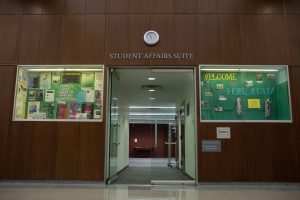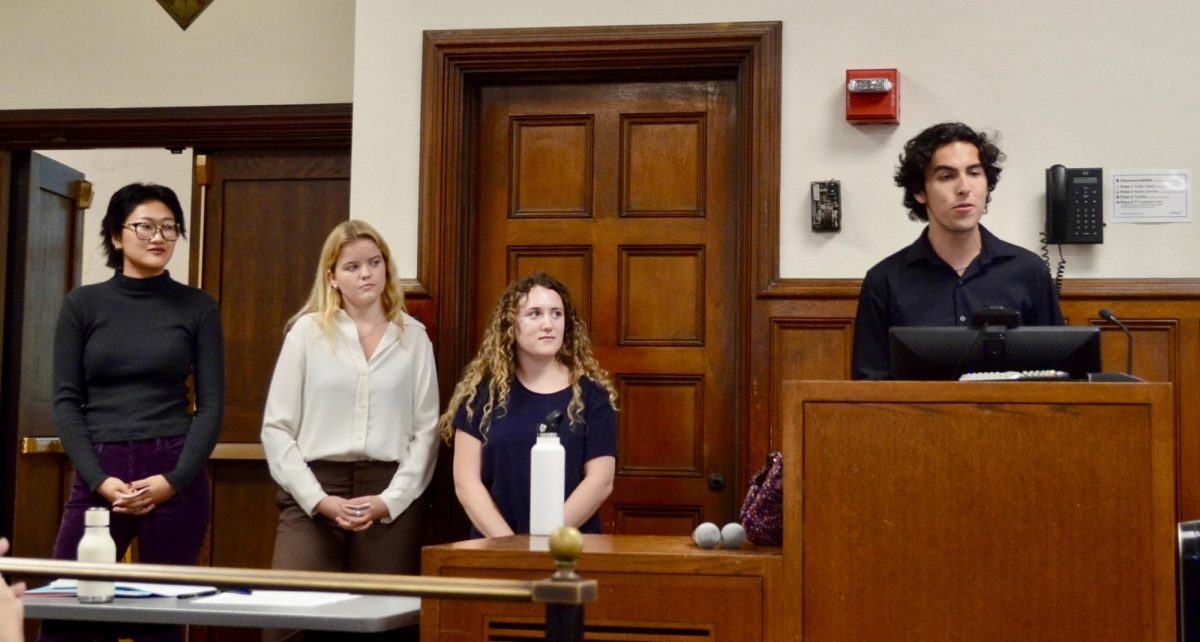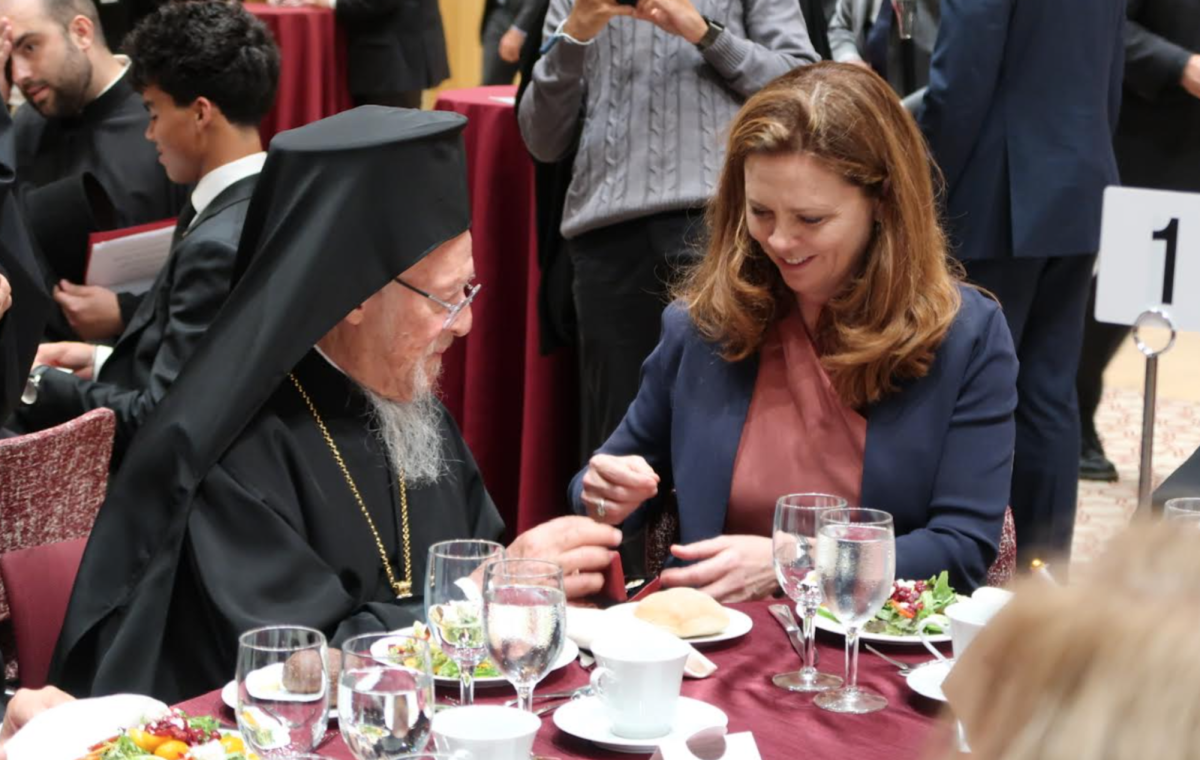By Jake Shore and Victor Ordonez

Katie Dolan, FCRH ‘18 and president of Mimes and Mummers, said that during her time in the club she has become accustomed to convincing the Office of Student Involvement (OSI) to allow production of controversial plays despite the office’s reservations.
But those concerns are typically leveled at dicier productions, according to Dolan. Though, she was shocked this February when an administrator from OSI conditionally denied the production of a Pulitzer Prize winning play, “Cat on a Hot Tin Roof,” a show set around a wealthy plantation family in Mississippi.
“The ‘n’ word appears various times, please be aware that EVERY ‘n’ has to be removed in your performance,” said Valentyna Yasinska, a former graduate assistant for student organizations and Planning for OSI, in emails obtained by The Fordham Ram.
This is just one of many instances that has prompted some student groups to question how the Fordham administration handles issues of free speech on campus. The Fordham Ram has reached out to several administrators and university clubs in an attempt to articulate the university’s policy surrounding club content.
In doing so, The Fordham Ram has found that club content is subject to a content approval process. This process requires that clubs submit content to OSI prior to any production or event. This content is then closely examined and evaluated by members of OSI before being approved. Clubs that must adhere to this process include Campus Activities Board (CAB), Fordham Experimental Theater (FET) and Mimes and Mummers.
No administrator contacted by The Fordham Ram admitted to the existence of such a process. Rather than call it an approval process, Dean of Student Involvement Cody Arcuri said that his office engages in “information sharing” with clubs prior to productions or events on campus.
“Part of this approach is making sure we are knowledgeable on student productions, performers, speakers and a seemingly endless variety of programs and events,” said Arcuri.
The Fordham Ram asked specifically if it was required that students submit content to be approved prior to any production or speaker event. Arcuri did not address this question in his comments.
When asked whether a production would be allowed to continue if a club did not submit content to OSI, Dean of Students Christopher Rodgers declined to comment. Rodgers also did not comment on the approval process’ existence.
However, emails obtained by The Fordham Ram prove the existence of an approval process which several clubs must adhere to.
Club members say that OSI, which Arcuri heads, will not provide funding for club events that have not gotten OSI’s approval first.
Before submitting the script for the spring production “Cat on a Hot Tin Roof,” Mimes and Mummers, one of the oldest running college theater groups in the country, had to send in their proposals to OSI for all the shows they wanted to put on for the 2016-2017 season.
In one of the emails obtained by The Fordham Ram, Alexandra Kearney, former assistant director for student organizations and programming, distinctly referred to an “approval process” that Mimes and Mummers’ content would be subject to if the group were to receive university funding. In the email, Kearney requests that OSI receive scripts in advance of their shows for the year, a procedure that many clubs on campus say is standard.
“If we cannot find a script [for example on Amazon], we can purchase the rights, however, we must request an advance script so that we may begin the approval process,” said Kearney in an email.
Later on in the summer, then vice president but current president of Mimes and Mummers, Katie Dolan, had sent in the scripts to OSI and was waiting for its approval for the fall production of the musical “Gypsy.” She had answered initial questions regarding how “burlesque” students on stage would be. In an email back, Kearney said Gypsy had “been conditionally approved for production” but would not be allowed to continue without a synopsis from Dolan on how the play fits into the “Jesuit tradition of the university.”
“In order for the play to become fully approved, we ask that you write a synopsis of how you plan on coordinating the scene of the burlesque number in line with the Jesuit tradition of the university. Please submit this as soon as possible,” said Kearney in an email.
Two weeks later, as Dolan had still not sent in a synopsis, Kearney reminded her that the one of the four shows that Mimes and Mummers puts on a semester still needed administration approval. Kearney said OSI would not let the performance go on without a synopsis.
“I believe I’m waiting on this still. Can you please let me know? We won’t be moving forward until I receive the synopsis,” said Kearney in another email.
Although the clubs were not outright censored, OSI required that club content be reviewed whenever the office found that the content did not meet what Kearney described as “the Jesuit tradition of the university.” Clubs would at times be asked to review and change aspects of their productions several times prior to approval from OSI.
The group was eventually able to put “Gypsy” on but received more pushback for its spring show. In February, members of the Mimes and Mummers went to OSI to dispute the requests from former administrator Valentyna Yasinska to remove the “‘n’ word,” in Cat on a Hot Tin Roof, but to no avail, said Dolan. She had go back to the script company to ask for an amended version of the play that did not feature the ‘“n word.” Dolan said they took the fact that there was no response as a rejection of that request.
It was only when Dean Rodgers and Dean Arcuri received an impassioned email from a member of Mimes and Mummers, who has since graduated, that they reconsidered the status of the production. In other obtained emails, the student wrote that “to prevent us from performing this piece at all is to censor one of the greatest pieces of American theatre (and American literature) from being made available—as it was intended to be seen by the author at the time in which it was written—to the larger Fordham community. This, too, seems puzzling, perhaps even irresponsible, particularly in light of Fordham’s core idea of cura personalis.”
Rodgers responded shortly after that the Mimes and Mummers should meet with OSI to talk about the play, and Arcuri eventually reversed OSI’s initial decision.
“Upon review, based on the concerns raised, we will not be moving forward with our original request and the play may be performed as it was originally written,” said Arcuri in obtained emails.
CAB, the club responsible for booking spring weekend performers and speakers, is also subject to an approval process. Maxson Thomas, FCRH ’18, the president of CAB, said the club is required to submit the lyrics of potential Spring Weekend performers to OSI. Thomas said that all content pertaining to a potential performer is required to be submitted via Google Docs, “where comments and highlighting can take place whenever and wherever.”
“CAB does submit a packet with [the] majority of proposed artists songs that are reviewed and looked over by the office for student involvement along with the concert committee’s Co-Chairs,” said Thomas.
Former president of CAB Stephen Esposito, FCRH ’17, has said that “part of the concert process is trying to find acts that fit into our Jesuit values and mission.”
Some students have said that the level of scrutiny from OSI has varied over the last few years. In her four years being involved with Mimes and Mummers, Dolan has said she has seen frequent administrator turnover in OSI, but not much in the way of coherence of how the administration applies its standards to club content. She said the pendulum has swung from little administration oversight in 2014, to “four or five people in and out of leadership in OSI” during 2015-2016, to this year where Dean Arcuri has been “giving them organized guidelines on what to do.”
“I understand this is a Jesuit university. It is a private university. We are receiving funding from the school, and I understand censorship is probably something that is going to happen. I understand why the school feels they have a compelling reason to do it,” said Dolan. “I just wish they would stay the same and I could operate within the rules.”
Though many of the standards seem to be concerned with administration issues with sexual acts or symbols being portrayed on stage, some seem to go as far as discrimination based on geography and nationality. Bianca Paolello, who formerly worked as an administrator in OSI, had specific issues with a student-written play for Fordham Experimental Theater (FET) last spring called STEXIT, a satire on people from Staten Island.
“I thought this could be taken offensively not only by ‘Staten Island-ers’ but Italians in general with your comment about them being the ‘lepers of society,’” said Paolello, in obtained emails.
Although Dean Rodgers denied multiple requests to comment on the existence of an approval process for clubs, he did release a statement to The Fordham Ram:
“The free exchange of ideas is a critical part of campus life and our club and organization advisers in Student Involvement support thousands of events per year. Along with our partners in student government and faculty advisers, we also seek to engage students in conversation and encourage discernment. I have seen over the years that the vast majority of our clubs approach event-planning quite thoughtfully and with the dignity of others — among other values the University holds dear — in mind.”
While the approval process is rigorous in many cases for student clubs, students say the same process is inconsistent with speakers and other events on campus.
College Democrats try to secure one high-profile speaker a semester and do not receive much oversight from OSI in terms of getting their speakers approved, according to club President Eleanor Werner, FCRH ’18. That is despite their speakers’ usual high price tag, estimated to cost the university around $20,000 per speaker per semester, according to College Democrats Vice President Sophia MacMaster, FCRH ’19.
Werner said they submit their requests for speakers, including biographies and additional details to United Student Government’s (USG) budget committee, not OSI. The requests then come right back to the club with approved contracts usually without a hitch. Werner said they will try to pitch a speaker “who represents the Jesuit values and isn’t too controversial, where it wouldn’t be a huge story to have them on campus.”
Werner said they try not to push for speakers that would give cause for OSI to deny their requests.
“Besides how much we know we’re going to get approved for, we know who they’re going to approve,” said Werner.
On the other hand, College Republicans hosted longtime Republican campaign advisor Roger Stone in October, and had him approved despite some limiting factors.
The Fordham Ram reported that College Republicans event for Republican campaign advisor Roger Stone’s speech was saved by a $1,500 donation by a sympathetic alumnus to a GoFundMe page set up for Stone. The speech went on despite a statement disavowing the speaker by the University president and sanctions from USG on College Republicans for language in their GoFundMe calling for donations. It read, “If you are a conservative and believe in free speech, donate. If you just want to see liberals squeal, Donate.”
In previous emails obtained by The Fordham Ram, Dean Arcuri allowed the College Republicans to move forward with their speaker, even after the GoFundMe was discovered by OSI.
“We will not be asking the College Republicans to discontinue use of the GoFundMe page. The College Republicans may continue to use GoFundMe to raise the remaining funds by tomorrow’s deadline,” said Arcuri in an email.
While denying comment on the existence of an approval process, Rodgers did supply The Ram with a copy of a “Proposal Review Process” from 2015, which allows clubs to appeal content previously denied by OSI. The proposal names OSI by its former name, the Office of Student Leadership and Community Development (OSLCD).
“If a club or organization is in discussion regarding the content of a proposal that receives a denial from the Office of Student Leadership and Community Development (OSLCD) the club should first meet with the staff member of OSLCD who denied the proposal in question,” said the proposal. The document continues to explain how content denial could potentially be overturned. The proposal is not available on Fordham’s website.
Some groups said they find that they are fighting for those appeals more than others. Declan Murphy, FCRH ’18, Business Manager on FET’s E-Board, said that organizations like his get the brunt of Fordham’s “arbitrary” rules while other club content gets a free pass. He said it should not be like that.
“Two people watching a show can have two very different interpretations of how something is. In that sense, it’s less a singular voice and less a voice of Fordham then inviting a speaker, someone like Roger Stone, says, ‘Ok, this is someone that we feel is worthy of having a voice,’” said Murphy. “When you invite a speaker, you are saying, to whatever degree, that they are valuable intellectually or politically or academically, and I think that is a stronger statement of support on the part of Fordham, than this is a work of art for you to interpret.”








































































































































































































James Demetriades • Nov 15, 2017 at 4:50 pm
Former VP and latter Interim President of the Mimes here, the script review process is crazy stringent. It is censorship of art plane and simple. I worked on 25 productions while at Fordham and the script approval process was slow and burdensome. There were frequently questions about presentation, content, and staging. All decisions that should be left up to the professional directors we hire and the artists, actors and designers working on the show. Great article exposing this cumbersome practice.